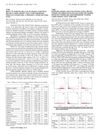 1 citations,
January 2020
1 citations,
January 2020 AMH levels in adolescents with PCOS are not affected by their weight.
1 citations,
January 2020 in “Egyptian Journal of Dermatology and Venereology” Higher testosterone and DHT levels are linked to hair loss in men, but not to prostate cancer risk.
1 citations,
May 2011 in “Hair transplant forum international” Injectable ACell with blood serum/PRP may slow hair loss and regrow thinning hair.
 July 2024 in “International Journal of Dermatology Venereology and Leprosy Sciences”
July 2024 in “International Journal of Dermatology Venereology and Leprosy Sciences” The hair growth serum effectively reduced hair fall, promoted growth, and increased hair thickness and density without side effects.
 March 2024 in “International journal of research in medical sciences”
March 2024 in “International journal of research in medical sciences” Dr. SKS hair booster serum effectively treats hair loss caused by COVID-19.

Valproic acid and rapamycin protect hair follicle stem cells from damage by activating a protective pathway.
 December 2023 in “Benha Journal of Applied Sciences”
December 2023 in “Benha Journal of Applied Sciences” Men with male pattern baldness have higher blood sugar, bad cholesterol, and ZAG protein levels than healthy men.
 December 2023 in “International journal of drug delivery technology”
December 2023 in “International journal of drug delivery technology” The polyherbal hair serum helped prevent hair loss and improved hair growth better than the usual treatment.
 December 2023 in “Jurnal Penelitian Pendidikan IPA”
December 2023 in “Jurnal Penelitian Pendidikan IPA” PRP heals pockmarked skin better than salmon DNA serum.
 November 2023 in “Dermatologic therapy”
November 2023 in “Dermatologic therapy” The scalp serum reduced scalp discomfort and symptoms without affecting skin moisture loss.
 October 2023 in “Benha Journal of Applied Sciences”
October 2023 in “Benha Journal of Applied Sciences” Men with male pattern baldness have lower levels of the antioxidant PON1.

The document concludes that activating hair roots is important for improving hair growth and preventing hair loss.

Kerascalp hair serum was found to be safe and effective in improving hair growth and strength in people with mild to moderate hair loss.
 January 2023 in “International Journal of Herbal Medicine”
January 2023 in “International Journal of Herbal Medicine” The hair growth serum was tested for safety and if it works in people with hair loss and for healthier hair.
 October 2022 in “Benha Journal of Applied Sciences”
October 2022 in “Benha Journal of Applied Sciences” Human Beta Defensin 1 levels do not predict the risk or severity of Alopecia Areata.
 October 2022 in “The Egyptian Journal of Hospital Medicine”
October 2022 in “The Egyptian Journal of Hospital Medicine” Females with idiopathic hirsutism have higher levels of omentin-1, which may lead to excessive hair growth.

Certain gene variations and different levels of BDNF and CRH hormones are linked to vitiligo.
 June 2022 in “Plastic and Reconstructive Surgery – Global Open”
June 2022 in “Plastic and Reconstructive Surgery – Global Open” Stem cell serum effectively treated hair loss caused by COVID-19.
 April 2022 in “Journal of Cosmetic Dermatology”
April 2022 in “Journal of Cosmetic Dermatology” Trimax-360 Serum, when used for 98 days, safely and effectively improves hair growth, thickness, and density without any side effects.
 January 2022 in “Al-Azhar Medical Journal”
January 2022 in “Al-Azhar Medical Journal” Higher antigliadin antibody levels are linked to alopecia areata severity.
 October 2021 in “International Journal of Research in Dermatology”
October 2021 in “International Journal of Research in Dermatology” People with alopecia areata often have low vitamin D levels, which may worsen their hair loss.
January 2021 in “AIP conference proceedings” A hair serum made from coffee by-products can promote hair growth and is safe, but needs less stickiness.
 January 2021 in “Benha Journal of Applied Sciences”
January 2021 in “Benha Journal of Applied Sciences” Prolactin levels and gene polymorphism are not linked to vitiligo severity but are related to BMI.
 December 2020 in “Benha Journal of Applied Sciences”
December 2020 in “Benha Journal of Applied Sciences” People with severe acne tend to have higher levels of betatrophin.
 January 2020 in “Benha Journal of Applied Sciences”
January 2020 in “Benha Journal of Applied Sciences” People with psoriasis have higher levels of Apelin-13 in their blood than healthy people.
 December 2019 in “Fayoum University Medical Journal”
December 2019 in “Fayoum University Medical Journal” People with Alopecia areata have higher levels of prostaglandin D2 in their blood and tissues.
 March 2018 in “Benha Journal of Applied Sciences”
March 2018 in “Benha Journal of Applied Sciences” Women with telogen effluvium have lower levels of VEGF, which may contribute to their hair loss.
January 2017 in “International Journal of Trichology” Vitamin D supplements might help reduce hair fall.
May 2015 in “Journal of the Egyptian Women's Dermatologic Society /Journal of the Egyptian Women's Dermatologic Society”  April 2013 in “The Journal of Urology”
April 2013 in “The Journal of Urology” Higher CRP levels suggest chronic inflammation is linked to bladder-related urinary symptoms in men with enlarged prostates.

























